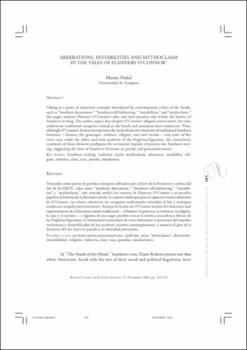Aberration, inestabilities and mythoclasm in the tales of Flannery O'Connor
Author
Nadal Blasco, María BenitaDate
2008Abstract
Tomando como punto de partida conceptos utilizados por críticos de la literatura y cultura del Sur de los EEUU, tales como “Southern aberrations,” “Southern self-fashioning,” “instabilities” y “mythoclasm,” este artículo analiza los cuentos de Flannery O’Connor y su peculiar papel en la historia de la literatura sureña. La autora señala que pese al supuesto conservadurismo de O’Connor, sus relatos subvierten las categorías tradicionales asociadas al Sur y anticipan
tendencias surgidas posteriormente. Aunque la ficción de O’Connor incluye los elementos más representativos de la literatura sureña tradicional —el humor, lo grotesco, la violencia, la religión, la raza y el racismo— y algunos de sus rasgos pueden evocar la estética masculina y blanca de los Fugitives/Agrarians, el tratamiento iconoclasta de estos elementos es precursor del impulso
revisionista y desmitificador de los escritores sureños contemporáneos, y anuncia el giro de la literatura del Sur hacia la parodia y la identidad postsureña. Taking as a point of departure concepts introduced by contemporary critics of the South,
such as “Southern aberrations,” “Southern self-fashioning,” “instabilities,” and “mythoclasm,”
this paper analyses Flannery O’Connor’s tales and their peculiar role within the history of
Southern writing. The author argues that despite O’Connor’s alleged conservatism, her tales
undermine traditional categories related to the South and anticipate later tendencies. Thus,
although O’Connor’s fiction incorporates the most distinctive elements of traditional Southern
literature —humor, the grotesque, violence, religion, race and racism— and some of her
views may evoke the white and male aesthetic of the Fugitives/Agrarians, the iconoclastic
treatment of these elements prefigures the revisionist impulse of present-day Southern writing, suggesting the turn of Southern literature to parody and postsouthernness.





